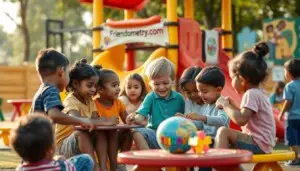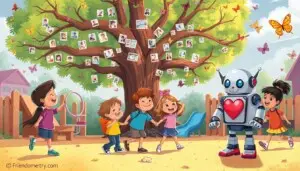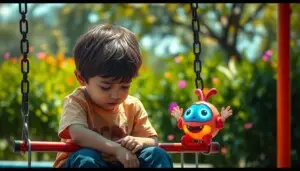My Son Struggles to Make Friends: Childhood friendships are key to a child’s growth. Parents worry when kids have trouble making friends. But, there are steps we can take to help.
This guide will share ways to boost your child’s social skills. It also offers advice for parents to help their kids make friends.
Friendometry.com is a great tool for parents. It’s a site aimed at ending childhood loneliness. Moms and dads can set up playdates there, helping kids find friends. Just having one friend can really change a child’s life.
Kids who act impulsively or are hyper often find it hard to make friends. Those on the autism spectrum might need to learn social skills on purpose. Things like making eye contact. Playdates with supervision can help them learn these important skills.
Parents should praise good behavior clearly to motivate their kids more than by criticizing. Starting playdates at home can ease shy kids into social situations. Kids who are shy might do better in clubs with structured activities. This helps them socialize and feel less anxious.
Key Takeaways
- Childhood friendships are essential for social and emotional development
- Supervised playdates can help children improve social skills
- Positive reinforcement is more effective than criticism in motivating kids
- Structured activities can benefit shy children in social situations
- Having one or two good friends is sufficient for a fulfilling social life
- Parenting styles impact a child’s ability to form friendships
- Friendometry.com offers a platform for parents to facilitate playdates
Understanding the Importance of Childhood Friendships
Childhood friendships are key to a child’s growth. They help shape social skills, emotional growth, and overall well-being. Let’s see why these friendships are so important.
Developmental Benefits of Peer Relationships
Friends help kids learn important social skills. They practice sharing, working together, and solving problems. These skills boost emotional smarts and help them handle social situations better.
Role of Friendships in Social and Emotional Growth
Friends teach kids empathy and understanding. They learn to think about others’ feelings and views. This is key for making strong relationships and doing well in social settings.
Long-term Impact on Self-esteem and Confidence
Having friends boosts a child’s self-esteem. It gives them a sense of belonging and approval. This confidence helps them in adulthood, affecting their relationships and happiness.
| Age Group | Friendship Characteristics | Parent’s Role |
|---|---|---|
| 3-4 years | Based on proximity and shared activities | Introduce accessible friends, encourage playdates |
| 5-7 years | Developing empathy and perspective-taking | Teach emotional literacy, foster positive interactions |
| 8-10 years | More complex social dynamics | Support conflict resolution, encourage diverse friendships |
Friendometry.com knows how crucial childhood friendships are. It helps parents set up playdates. This way, kids can make real connections. Remember, just one good friend can change a child’s life a lot.
Recognizing Signs That Your Child Is Struggling to Make Friends
Parents often worry about their children’s social skills. It’s normal for kids to have different friendship patterns. But, some signs show a child might be having trouble making friends.
Kids usually have a few close friends and many acquaintances. If your child always plays alone or feels lonely, they might be having trouble.
Watch for these indicators:
- Reluctance to participate in group activities
- Difficulty sharing or taking turns
- Trouble engaging in imaginative play with peers
- Expressing feelings of rejection or isolation
- Impulsive behavior or anger outbursts during social interactions
Teachers can give you insights into your child’s social life at school. Talk to them to understand your child’s social behavior better.
| Age Group | Typical Friendship Patterns | Potential Red Flags |
|---|---|---|
| Early School Years | Play with different friends daily | Consistently playing alone |
| Primary School | 1-2 close friends, wider friend group | No consistent friendships |
| Older Children | Stable friend groups, shared interests | Frequent social conflicts, isolation |
Every child learns social skills at their own pace. Friendometry.com has resources for parents to help their kids make friends and beat loneliness. Spotting these signs early can help your child make better connections.
My Son Struggles To Make Friends: Common Challenges and Causes
When a child can’t make friends, it’s hard for parents. It’s important to know why they struggle. This helps with social skills.
Social Skill Deficits
Many kids have trouble in social situations because they lack social skills. This shows in different ways:
- Trouble understanding social cues
- Difficulty with turn-taking in conversations
- Challenges in expressing empathy
- Inability to read body language
Shyness and Anxiety
Shyness and anxiety can stop a child from connecting with others. Social anxiety makes some kids avoid social events. This can make them feel lonely and unseen.
Behavioral Issues Impacting Peer Relationships
Some behaviors make it hard for kids to keep friends:
- Hyperactivity or impulsivity (often associated with ADHD)
- Aggressive behavior or difficulty sharing
- Misinterpreting social situations negatively
Friendometry.com helps parents whose kids can’t make friends. This site lets parents arrange playdates. It could really help a child’s social life.
| Challenge | Impact on Friendships | Potential Solutions |
|---|---|---|
| Low self-esteem | Reluctance to engage with peers | Building confidence through positive reinforcement |
| Speech delays | Difficulty in communication | Speech therapy and social skills practice |
| Social anxiety | Avoidance of social situations | Gradual exposure to social settings, professional support |
Knowing these challenges helps parents help their child. They can grow emotionally and socially. This leads to real friendships.
The Role of Parents in Fostering Social Skills
Parents are key in helping their kids learn how to be social. They do this by giving advice and showing how to talk well. Studies say 70% of parents know they help shape their kids’ social skills.
Setting up playdates and group activities helps kids learn about making friends. For toddlers, these should be short to avoid feeling overwhelmed. As they get older, parents can help them navigate harder social situations, boosting their emotional smarts.
Teaching kids about empathy, sharing, and listening is crucial for good relationships. When parents act this way, it really shows kids the ropes. The Center for Parenting Education says that what adults do affects kids’ social skills a lot.
| Activity | Benefit | Success Rate |
|---|---|---|
| Extracurricular activities | Improve social skills | 45% |
| Structured friendship groups | Enhance social interactions | 50% |
| Collaborative activities | Progress in social skills | 65% |
Friendometry.com is a great tool for parents wanting to grow their child’s social circle. This platform helps set up playdates. It could really change a child’s life by helping them make strong friendships.
Developing Emotional Intelligence and Self-Regulation
Building emotional intelligence and self-regulation skills is key for kids to do well socially. These skills help with strong social skills and good communication. Let’s see how parents can help their kids grow these important qualities.
Teaching Empathy and Perspective-Taking
Empathy is a big part of emotional intelligence. Parents can help by talking about feelings and helping kids see others’ feelings. Role-playing helps kids get better at seeing things from another’s point of view. Studies show that parents who coach their kids about feelings are more in tune with their kids’ feelings.
Helping Children Manage Negative Emotions
Self-control is important for success. Kids who can handle their feelings well are liked more by others. Parents can teach kids to pause, breathe deeply, or focus on something else to manage tough feelings.
Encouraging Positive Social Behaviors
It’s important to teach kids to act kindly towards others. Parents can help kids deal with anger in a healthy way, ask for help, and laugh at themselves. These skills make better friends and help solve problems.
| Age | Emotional Development Milestone |
|---|---|
| 4 years | Begin using strategies to eliminate disturbing external stimuli |
| 10 years | Consistently use complex strategies for emotional self-regulation |
Websites like Friendometry.com can help parents improve their kids’ social skills and find friends. Having just one friend can really change a child’s life.
Practical Strategies for Improving Social Skills at Home
Boosting your child’s social skills starts at home. Parents are key in helping kids with communication and making friends. Here are some ways to help your child do well socially.
Reading is great for social growth. Kids who read a lot do better in writing, spelling, and knowing words. This helps them talk and connect with others better. Make reading a daily thing to boost your child’s talking skills.
Role-playing is also helpful. Act out social situations with your child, like saying hello and talking. This makes them feel more at ease in real life. Remember, looking into someone’s eyes during these plays is important – it makes social talks better.
- Encourage asking questions to develop curiosity and conversational skills
- Teach about emotions to improve understanding and recognition in others
- Practice active listening, including providing feedback
- Use technology wisely with apps for word recognition and language development
For parents looking for more help, Friendometry.com is a great site. It helps kids make friends, which can really change their social life.
By using these tips often, you’re building a strong base for your child’s social skills. Every little bit helps your child make friends and handle social situations with ease.
Creating Opportunities for Social Interaction
Building connections and fostering peer relations are key for kids’ social growth. Parents can help their kids meet others and learn social skills.
Organizing Playdates and Group Activities
Supervised playdates are great for kids to learn social skills. Parents can set these up based on what kids like, helping them make friends. Activities like board games or playing outside can help kids work together and talk more.
Encouraging Participation in Clubs and Extracurricular Activities
Being in clubs or extra activities can make kids more confident socially. These places let kids meet others who like the same things. Kids can try out sports, art, or science clubs to find what they like while making friends.
Utilizing Community Resources for Socialization
Places like libraries, parks, and community centers are great for kids to meet others. They often have events or programs for kids. Parents can also use online sites like Friendometry.com to meet other families and plan playdates.
| Activity | Social Skill Improvement | Engagement Level |
|---|---|---|
| Playdates | 50% | High |
| Club Participation | 65% | Medium-High |
| Community Events | 40% | Medium |
By making these social chances, parents help their kids learn how to make friends and connect with others.
The Power of Cooperative Play and Activities
Cooperative play changes the game for social skills. It brings kids together to work towards goals and make friends. Unlike competitive games, these activities build unity and teamwork.
At Friendometry.com, we know how key these moments are. Our site helps parents set up playdates. This lets children enjoy working together. Even having one friend can greatly help a child.
Studies show the good stuff about cooperative play:
- It boosts language and math skills
- Improves solving problems
- Increases emotional smarts and caring
- Teaches sharing and taking turns
Parents can push for cooperative play at home by:
- Playing team-based board games
- Cooking together
- Solving puzzles or building with blocks
- Doing group art projects
These activities do more than just help with making friends. They also help kids deal with stress and get stronger. By creating a cooperative setting, we’re helping our kids make strong friendships.
Play is super important for kids. The American Academy of Pediatrics says it’s a must for kids up to age 2. So, let’s make sure to focus on cooperative play. This way, our kids’ social skills will grow strong.
Addressing Specific Social Challenges: Shyness, Anxiety, and Impulsivity
Children face many social challenges as they grow. Shyness, anxiety, and impulsivity can make it hard for kids to make friends. Let’s look at ways to help children overcome these issues and gain confidence.
Strategies for helping shy children connect
Shy kids often find it hard to talk to others. Begin with playdates at home where they feel secure. Then, slowly introduce them to new social places to help them get used to it. Friendometry.com is a great place for parents to arrange playdates, helping shy kids make friends safely.
Managing social anxiety in children
Many children struggle with social anxiety, which can stop them from making friends. Cognitive behavioral therapy can change their thoughts and help them handle their feelings better. Teaching them about emotional intelligence, like knowing and sharing feelings, can really boost their social confidence.
Techniques for improving impulse control in social situations
Impulsive behavior can make it hard for a child to get along with others. Start practicing turn-taking and anger control at home. Role-playing different situations can also help them learn how to communicate better and respond correctly.
| Challenge | Strategy | Benefit |
|---|---|---|
| Shyness | Gradual exposure to social situations | Builds confidence in social settings |
| Social Anxiety | Cognitive behavioral therapy | Helps manage anxious thoughts and emotions |
| Impulsivity | Practice turn-taking and self-regulation | Improves social interactions and relationships |
By tackling these challenges, parents can help their kids develop great social skills and make lasting friends. Remember, every child is different, so be patient and keep trying in their social growth journey.
Leveraging Technology and Online Platforms for Social Connections
In today’s digital age, technology helps kids make friends. Online platforms offer safe places for them to meet. Friendometry.com is a great way for parents to arrange playdates and find friends for their kids.
This website lets parents set up playdates easily. It’s great for shy kids or those who find it hard to make friends in school. Friendometry.com aims to end childhood loneliness and bring happiness, one child at a time.
But, it’s key to balance online time with real-life socializing. Online chats or supervised activities can help kids practice social skills. Yet, real-life friendships are still key for lasting connections.
- 42% of children 8 and under have their own tablet device
- 29% of children 8 and under have their own smartphone
These numbers show how big a role tech plays in kids’ lives. Parents can use platforms like Friendometry.com to help their kids make friends. Just one friend can really help a child feel better about themselves and improve their social skills.
By mixing tech with real-life socializing, parents can help their kids make strong, true friends. This way, kids learn to handle both online and real-world social situations well.
Conclusion: Supporting Your Child’s Journey to Building Meaningful Friendships
Childhood friendships are key to a child’s growth. As parents, we can help our kids make friends. We do this by teaching them about feelings and how to connect with others.
Studies show that having friends is good for kids. Activities like martial arts can make kids more confident. They learn how to talk to others and be true to themselves.
It’s important to have a few close friends, not just many. A big circle of friends helps kids feel supported when they face social challenges. Sites like Friendometry.com help parents find friends for their kids, making a big difference.
We should teach our kids how to solve problems and be kind to everyone. With time and the right help, our kids can make friends that make them happy and help them grow.







